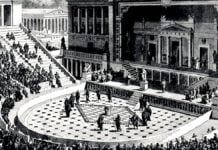William Stanley Houghton was an English dramatist who was a prominent member of a group of playwrights known as the Manchester School of Dramatics. He was influenced strongly by Ibsen. Houghton’s plays were set locally in Northern England but represented universal aspects of human nature. Houghton left his office job in 1912 to become a full-time dramatist and moved to London. There, he became part of the city’s dramatic and literary culture.
In the play, The Dear Departed, Stanley Houghton satirises the degradation of moral values in the British middle class. It depicts the sad reality of modern nuclear families strained by selfish interests and individual desires. Reflecting the society at large, the tale takes place at the house of the Slaters. In trying to grab the things belonging to their father, the children disregard entirely modesty, decency and obligation towards their family. The play was first produced in Manchester in 1908.
Summary
Amelia Slater is one of two daughters of Abel Merryweather, who lives with her. The other daughter, Elizabeth, and her husband, Ben Jordan, stay separately. The two sisters are not on talking terms with each other as they often quarrel about things when in the same place. Mrs Slater’s husband, Henry and daughter, Victoria, stay in the house with her father but rarely care about his health and happiness.
One day, Mrs Slater offers something to her father, Mr Merryweather and finds him quite cold, not responding. He is motionless. She assumes the worst and declares him dead. She asks Victoria to change into sober clothes as a form of respect as they mourn her father’s demise.
Henry joins them, and the three start rearranging Mr Merryweather’s things for their benefit. Accordingly, the Jordans are informed about the sudden demise of their father. Mrs Slater was unwilling to share her father’s belongings with Mrs Jordan. Victoria is asked to keep a watch on the main door to inform her mother about the arrival of the Jordans. Aware of the time that was at hand, Henry is encouraged by his wife to take her father’s slippers. Then, the two move her father’s bureau into their room in place of their old, creaky chest. Henry is not too happy about such disregard for the things of the recently departed, and Victoria expresses her discontent vocally but to no avail.
Soon, the Jordans arrive, and the sisters give each other a cold and customary kiss. The four of them waste no time discussing the funeral, particularly the bestowal of their father’s things. The departed’s insurance and the contents of his obituary are discussed. They decide to start dividing his things, and Mrs Slater asks Victoria to go to her grandfather’s room. Irritated by her mother’s greed and frostiness, she trudged to the room reluctantly.
Surprisingly, the play witnesses a turn of events at this point. Victoria, sent to their grandfather’s room, returns with an expression of white horror on her face. She informs them that the dead have reawakened and is preparing to talk with them all. To everybody’s surprise, grandfather is seen coming downstairs. Mr Merryweather is surprised to see his estranged daughter in the house as they have not come to meet him for several years. The fact that all the people are dressed in clothes worn for mourning baffles him.
Mrs Slater tries to quell any suspicion by saying that Ben has had a family bereavement and they are honouring the dead with their attire. Suddenly, her father notices Henry wearing his footwear. Victoria quickly seizes them and offers them to him. His father asks about his bureau, and Mrs Slater is mortified to devise a sound excuse for moving it.
Elizabeth, taking the opportunity to have a dig at her sister, accuses her and Henry of stealing. This ticks the Slaters, and both couples resort to finger-pointing and name-calling. The truth is finally exposed, and their father is devastated by their lack of compassion and care for him. He gathers courage and decides to make wholesale changes the following Monday. First, he teases his daughters by saying that he will offer his will to the daughter in whose house he will die. The sisters quite expectedly begin to quarrel over it as well.
On knowing the harsh reality, the grandfather decides not to live with any of his daughters. To everyone’s surprise, he proclaims that he is giving all his belongings to Mrs John Shorrocks, the keeper of ‘Ring – O – Bells’, who loves and truly worries for him. They will marry each other and spend the rest of their days caring for one another. In the end, with a cheek in his tone, he asks his daughters and their greedy husbands to attend the wedding and bless the bride and groom.
Analysis
As the dramatic tapestry of the play unfolds, the discerning audience is treated to a captivating spectacle of familial dynamics, replete with the intricate interplay of petty arguments and cunning schemes. Each family member, driven by their insatiable desire to secure their stake in the estate, embarks on a relentless pursuit of various coveted items. In this compelling narrative, the characters Victoria, Ben, Henry, and Amelia are skillfully crafted to embody the timeless theme of the human condition. As the story unfolds, their true selves are artfully unveiled, exposing a profound inclination towards pursuing material wealth at the expense of authentic emotional connections. This thematic exploration delves into the depths of human nature, shedding light on the complexities and contradictions that reside within us all. Through the lens of these characters, the author masterfully examines the delicate balance between worldly desires and the profound yearning for genuine emotional fulfilment.
Houghton’s theatrical masterpiece deftly employs satire to expose society’s inherent shallowness and superficiality. Through the artful portrayal of characters who engage in a facade of mourning while clandestinely revelling in the prospect of a substantial inheritance, the playwright unveils the intricate layers of duplicity that exist beneath the veneer of societal norms. This astute critique of human nature is a poignant reminder of the problematic dichotomy between public displays of grief and the concealed motives beneath. With a deft touch of humour and sharp wit, the playwright deftly exposes the inherent shallowness of the characters’ actions, thereby underscoring the profound significance of genuine human connections over the fleeting allure of material possessions.
Irony in the Title
The Dear Departed means the death of a dear one. In the play, it is seen that neither the person who was presumed to be dead was, in reality, dead, nor was he considered ‘dear’ by her daughters. The irony is reflected in the fact that none of the daughters cared about Abel Merryweather, who was presumed to be dead because they cared more about his material possessions than mourning his death. The irony is that the title represents something quite opposite to the story’s plot.
Characters
Abel Merryweather
Abel Merryweather is an old widower over seventy; he is bright and vigorous with a twinkle in his eye. Since the death of his wife, he has been living in turns with his daughters, Amelia Slater and Elizabeth Jordan. He is a fun-loving and cheerful man who loves to go to the pub and drink. Mr Merryweather is quick-witted and too intelligent to be fooled by any show of affection by his daughters. He knows them too well but lives with them because they are his daughters, and he wants to leave something to them in his will. But when the old man discovers how they behaved, believing him dead, he changes his will and decides to marry a widow, Mrs John Shorrocks, the keeper of ‘Ring – O – Bells’. He is a likeable old man, much better than his daughters.
Amelia Slater
Amelia is the elder daughter of Abel Merryweather. She is married to Henry Slater and has a ten-year-old daughter, Victoria. She is a very dominating person by nature and ensures that everything happens according to her will. Mrs Slater makes her husband do all she wants. She can talk her way through any argument. She is cunning and sharp and cares only for the material world. She is a tart and biting person regarding her gain. She is never contended or sated with what she already has. There is always a need for more in her. She wants a significant part of her father’s inheritance and tries to get it by unfair means. She is pretentious and worries about what people will think about her mourning; therefore, she sheds fake tears. She feels no genuine sorrow for her dead father. Ultimately, when it comes to winning Mr Merryweather’s favour, she alters her plans entirely just to get hold of her money.
Elizabeth Jordan
Elizabeth is the sister of Amelia Slater and the second daughter of Abel Merryweather. Like her sister, she has no feelings for her father or sister. She is stout, complacent, impassive, and has an irritating air of always being right. Mrs Jordan is very witty and sharp. She can drive a hard bargain over things to gain possession. She, too, is greedy, just like her sister, who takes every opportunity to criticise the Slaters and finally decides to take her father with her just for the sake of money.
Henry Slater
Henry Slater is Amelia’s husband and is far more honourable than anyone in this play. He is more sensible than the other characters in the play. Mr Slater gives logical suggestions while talking about the obituary notice to be given in the paper. He is a henpecked husband with no will and no say in the house. He does what his wife tells him to do. Although he’s not as evil and greedy as his wife Amelia, he helps her hide some things about Mr Merryweather before the arrival of Amelia’s sister. He also wears his dead father-in-law’s slippers because his wife asks him to do it.
Ben Jordan
Ben Jordan is Elizabeth’s husband, a jolly little man with a chirpy voice. He is a practical man and a big hypocrite in the play. He is practical when he says that everyone has got to die someday and is not at all mournful that Mr Merryweather passed away. Mr Jordan called Mr Merryweather’ the drunken old beggar’ because the latter had not paid the premium for his insurance. This meant that none of the family members could get his insurance money, which angered and disgusted everyone in their family. This incident shows that Mr Jordan was very logical and very materialistic. He did not believe in the importance of relationships.
Victoria Slater
A girl of ten, Victoria is an obedient child. She is very fond of her grandfather and has genuine feelings of love towards him. She is an intelligent child. This young girl’s presence in the play comes as a whiff of a cool breeze in the stuffiness generated by the adults’ scheming, quarrelling and scrupulosity.
Theme
The Dear Departed is a masterful exploration of the multifaceted themes of greed, hypocrisy, family relationships, and social satire. With a deft hand, the author skilfully weaves together these intricate threads to create a tapestry of human nature and societal critique. Through its nuanced portrayal of characters and their interactions, the narrative delves deep into the dark recesses of the human psyche, exposing the inherent flaws and contradictions that lie beneath the surface of seemingly ordinary lives. With its astute observations and biting wit, The Dear Departed stands as a testament to the power of literature to illuminate the complexities of the text and presents a profound and incisive exploration of the intricacies of human nature, exposing the inherent flaws that plague society. It delves into the repercussions that arise from the misguided emphasis on material wealth, which ultimately eclipses the significance of genuine human connections.



























